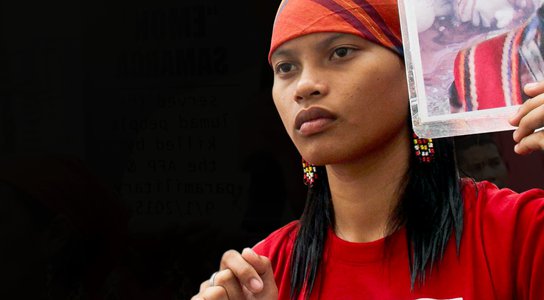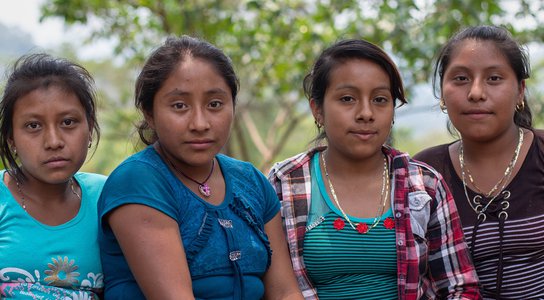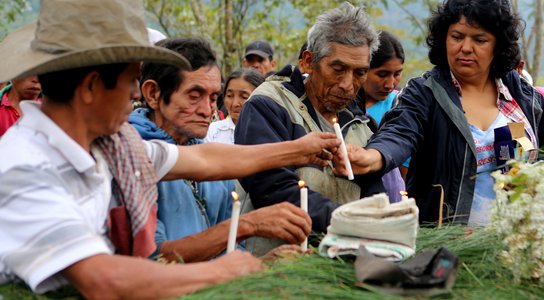Businesses and investors must join governments in consulting and protecting communities and activists if environmental disasters are to be averted, says new UN report.
If governments, companies and investors don’t change the
way they do business, then more environmental activists will die and the planet
will be exposed to irreversible destruction. This is the urgent message I
delivered to the UN General Assembly last week.
According to Global Witness, 185 people were murdered in 2015 for denouncing abuses linked to mining, hydroelectric, agribusiness and other extractive industries. These people are known as land and environmental defenders.
In many cases the projects these activists objected to were already underway, with authorities and businesses anxious to see a return on investment. Activists and communities were excluded from decisions about where and how projects should be developed and - when they spoke truth to power - they paid with their lives.
My new report, therefore, advocates a preventative approach. Currently, a mix of public officials, businesses, investors and foreign governments decide how large-scale development projects are designed and implemented. Local voices are often ignored, resulting in the theft of their land, the pollution of their water, or the destruction of their forests.
If communities and environmental defenders were active partners in the design of projects from the very beginning, it would make them less vulnerable to attacks later. It is an approach which lowers risks for investors too, with a greater chance of long-term returns if local tensions and future abuses are avoided and mitigated with the guidance of local defenders.
My report contains concrete recommendations for how a range of actors can tackle the root causes of risk for environmental activists; responding when they are attacked, and contributing to a safe and enabling environment for their work.
Firstly, states should guarantee that no concession is granted for natural resource exploitation before local civil society has been properly consulted. Only 22 States have ratified ILO Convention 169 on the free, prior and informed consent of indigenous peoples regarding the use of their resources, and implementation is often woeful. This must change. Governments should make it easier for civil society to gain access to information, and work with local activists to develop National Action Plans on business and human rights, which articulate how land and environmental defenders will be protected in the context of business; something that existing efforts by the UK and Colombia touch upon, though without commensurate detail.
Businesses should guarantee the early and meaningful participation of local communities and independent experts in the development of human rights, social and environmental impact assessments, regardless of whether the State has obliged them too. Companies must take action to guarantee that they and their subsidiaries respect the rights of environmental defenders, protect them, and uphold the highest standards of transparency. Adidas recently became the first company to publish a dedicated policy on human rights defenders, though a comprehensive strategy would be fleshed out with greater detail regarding the concrete actions necessary to keep activists safe.
The growing commitment of international financial institutions (IFIs) to responsible financing is positive. However, as proponents of many projects around which defenders have been threatened, IFIs such as the International Finance Corporation and the Inter-American Development Bank must use their leverage to legitimise the role of civil society. IFIs should respond to the call of NGOs and develop specific policies to ensure that their activities, grants and loans do not contribute to violations against activists.
The World Bank should respond to criticism and use upcoming internal evaluations to strengthen its approach to environmental assessments, indigenous peoples and disclosure of information. The Dutch Development Bank (FMO), meanwhile, is in a perfect position to learn from experience and develop a policy for working with human rights defenders which might help avoid tragedies like the murder of Berta Caceres, who opposed the Agua Zarca dam which the FMO had invested in.
Finally, investor countries need to demonstrate that they can consult and protect local activists with the same degree of efficiency they show when facilitating investment abroad.
Trade agreements involving countries where environmental defenders are at risk should include mechanisms to prevent and respond to violations against them, whilst States must legislate at home to ensure their businesses respect rights abroad. Meanwhile those with specific foreign policy guidelines on human rights defenders - such as Norway, Switzerland, the EU and the OSCE - should ensure they are adapted and applied to cases of land and environmental defenders exposing violations by business.
Never has the defence of the planet’s environment been more important and yet never have those leading this struggle faced greater risks. If states, businesses and investors are serious about human rights, sustainability and the environment, then now is the time to listen to defenders and decide together how best to implement these recommendations before it’s too late.
Michel Forst is the United Nations Special Rapporteur on the situation of human rights defenders. His new report is available online in English, French and Spanish. Follow him on Twitter on @ForstMichel


